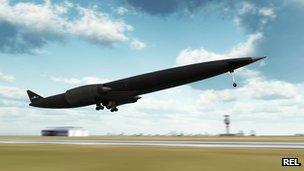UK Space Conference launches in Glasgow
- Published
Britain's first astronaut Tim Peake talks about his forthcoming space mission
Just for a change, this is rocket science.
And software design and ground stations and sensors and all the other elements which make up the UK space industry.
UK space industry? Yes, there actually is such a thing. And it's bigger than you might think.
It's currently worth £9bn a year and involves tens of thousands of highly skilled workers. Not bad for a nation that slouched out of the space launcher business in the early 1970s when it scrapped the Blue Streak and Black Knight rockets.
As the UK Science Minister David Willetts will point out in Glasgow on Tuesday, the UK thus became the only nation in space history to develop a launch capability and abandon it.
We might not be going back into the orbital launcher business on our own any time soon, but it's clear Whitehall senses a second chance to get into the space business in a big way.
The target is to capture 10% of the global market by 2030, and the UK Space Conference in Glasgow will hear Mr Willetts unveil almost £200m of public investment in British space technology.
In a move trailed in the chancellor's Spending Review, the UK government is giving £60m towards the Sabre project. It's developing an air-breathing rocket engine which powers a spacecraft that would take off like a plane - and keep on climbing into orbit.
Technological breakthroughs
It is a concept which has been around since the 1960s. But while it looked easy enough on Thunderbirds, here in the non-puppet community it has proved a far tougher task.
Two decades of research have already produced technological breakthroughs, however. These include ultra-lightweight heat exchangers which can cool airstreams from over 1,000C to - 150C in less than a hundredth of a second.
Success for Sabre would mean the end of the throwaway era of space exploration, a spaceplane that would be reusable and could take off and land like any other aircraft. In theory costs will come down and reliability soar.
The other £134m in the announcement will be coming from the European Space Agency (ESA) to develop sensors for the next generation of EUMETSAT weather satellites. They'll be built in Portsmouth - part of the dividend that has flowed from the UK government's decision to increase its contribution to the European space effort.
But what is Scotland's place in space?
Romantics may point back to the Borders ancestry of Neil Armstrong or wait patiently for the birth of Star Trek's ace engineer Montgomery "Scotty" Scott, allegedly due in Linlithgow in March 2222.
But there's a lot going on here and now.
Scouts Astronautics
The first Scottish-built satellite - the UK Space Agency's UKUBE-1 - is due to launch in late October. It's been built by the Clyde Space company in Glasgow and will pack several scientific experiments into its modest 3-litre bulk.
Nasa's James Webb space telescope - the replacement for the veteran Hubble telescope - will carry an infrared sensor package created in Edinburgh at the UK Astronomy Technology Centre.

The Skylon spaceplane would do the job of a rocket but take off like a conventional aeroplane
Several of Scotland's universities are also active in space science and have helped spawn spinout companies.
But Scotland's first person in space? We'll have to wait a bit for that.
So far ESA has selected just one Briton to be an astronaut. He's Sussex-born Major Tim Peake and he is not due to be launched towards the International Space Station before 2015.
He is attending the Glasgow conference too. One of his duties will be to present the first of a new scouting badge. The Scouts Astronautics Activity Badge will go to a pioneering group of young people who have examined the past, present and future of space exploration.
Who knows? Perhaps the first Scot on Mars will be wearing one.
- Published28 November 2012
- Published20 November 2012
- Published20 March 2012
- Published23 February 2012
- Published6 July 2011
- Published1 February 2011
- Published10 January 2011
- Published27 July 2010